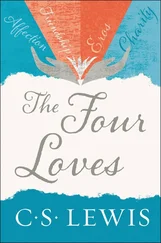But only part. For now we must face a topic that I have long postponed. Hitherto hardly anything has been said in this book about our natural loves as rivals to the love of God. Now the question can no longer be avoided. There were two reasons for my delay.
One—already hinted—is that this question is not the place at which most of us need begin. It is seldom, at the outset, "addressed to our condition." For most of us the true rivalry lies between the self and the human Other, not yet between the human Other and God. It is dangerous to press upon a man the duty of getting beyond earthly love when his real difficulty lies in getting so far. And it is no doubt easy enough to love the fellow–creature less and to imagine that this is happening because we are learning to love God more, when the real reason may be quite different. We may be only "mistaking the decays of nature for the increase of Grace". Many people do not find it really difficult to hate their wives or mothers. M. Mauriac, in a fine scene, pictures the other disciples stunned and bewildered by this strange command, but not Judas. He laps it up easily.
But to have stressed the rivalry earlier in this book would have been premature in another way also. The claim to divinity which our loves so easily make can be refuted without going so far as that. The loves prove that they are unworthy to take the place of God by the fact that they cannot even remain themselves and do what they promise to do without God's help. Why prove that some petty princeling is not the lawful Emperor when without the Emperor's support he cannot even keep his subordinate throne and make peace in his little province for half a year? Even for their own sakes the loves must submit to be second things if they are to remain the things they want to be. In this yoke lies their true freedom; they "are taller when they bow". For when God rules in a human heart, though He may sometimes have to remove certain of its native authorities altogether, He often continues others in their offices and, by subjecting their authority to His, gives it for the first time a firm basis. Emerson has said, "When half–gods go, the gods arrive." That is a very doubtful maxim. Better say, "When God arrives (and only then) the half–gods can remain." Left to themselves they either vanish or become demons. Only in His name can they with beauty and security "wield their little tridents". The rebellious slogan "All for love" is really love's death warrant (date of execution, for the moment, left blank).
But the question of the Rivalry, for these reasons long postponed, must now be treated. In any earlier period, except the Nineteenth Century, it would have loomed large throughout a book on this subject. If the Victorians needed the reminder that love is not enough, older theologians were always saying very loudly that (natural) love is likely to be a great deal too much. The danger of loving our fellow creatures too little was less present to their minds than that of loving them idolatrously. In every wife, mother, child and friend they saw a possible rival to God. So of course does Our Lord ( Luke XIV, 26).
There is one method of dissuading us from inordinate love of the fellow–creature which I find myself forced to reject at the very outset. I do so with trembling, for it met me in the pages of a great saint and a great thinker to whom my own glad debts are incalculable.
In words which can still bring tears to the eyes, St. Augustine describes the desolation in which the death of his friend Nebridius plunged him ( Confessions IV, 10). Then he draws a moral. This is what comes, he says, of giving one's heart to anything but God. All human beings pass away. Do not let your happiness depend on something you may lose. If love is to be a blessing, not a misery, it must be for the only Beloved who will never pass away.
Of course this is excellent sense. Don't put your goods in a leaky vessel. Don't spend too much on a house you may be turned out of. And there is no man alive who responds more naturally than I to such canny maxims. I am a safety–first creature. Of all arguments against love none makes so strong an appeal to my nature as "Careful! This might lead you to suffering".
To my nature, my temperament, yes. Not to my conscience. When I respond to that appeal I seem to myself to be a thousand miles away from Christ. If I am sure of anything I am sure that His teaching was never meant to confirm my congenital preference for safe investments and limited liabilities. I doubt whether there is anything in me that pleases Him less. And who could conceivably begin to love God on such a prudential ground—because the security (so to speak) is better? Who could even include it among the grounds for loving? Would you choose a wife or a Friend—if it comes to that, would you choose a dog—in this spirit? One must be outside the world of love, of all loves, before one thus calculates. Eros, lawless Eros, preferring the Beloved to happiness, is more like Love Himself than this.
I think that this passage in the Confessions is less a part of St. Augustine's Christendom than a hangover from the high–minded Pagan philosophies in which he grew up. It is closer to Stoic "apathy" or neo–Platonic mysticism than to charity. We follow One who wept over Jerusalem and at the grave of Lazarus, and, loving all, yet had one disciple whom, in a special sense, he "loved". St. Paul has a higher authority with us than St. Augustine—St. Paul who shows no sign that he would not have suffered like a man, and no feeling that he ought not so to have suffered, if Epaphroditus had died. ( Philem. II, 27).
Even if it were granted that insurances against heartbreak were our highest wisdom, does God Himself offer them? Apparently not. Christ comes at last to say "Why hast thou forsaken me?"
There is no escape along the lines St. Augustine suggests. Nor along any other lines. There is no safe investment. To love at all is to be vulnerable. Love anything, and your heart will certainly be wrung and possibly be broken. If you want to make sure of keeping it intact, you must give your heart to no one, not even to an animal. Wrap it carefully round with hobbies and little luxuries; avoid all entanglements; lock it up safe in the casket or coffin of your selfishness. But in that casket—safe, dark, motionless, airless—it will change. It will not be broken; it will become unbreakable, impenetrable, irredeemable. The alternative to tragedy, or at least to the risk of tragedy, is damnation. The only place outside Heaven where you can be perfectly safe from all the dangers and perturbations of love is Hell.
I believe that the most lawless and inordinate loves are less contrary to God's will than a self–invited and self–protective lovelessness. It is like hiding the talent in a napkin and for much the same reason. "I knew thee that thou wert a hard man." Christ did not teach and suffer that we might become, even in the natural loves, more careful of our own happiness. If a man is not uncalculating towards the earthly beloveds whom he has seen, he is none the more likely to be so towards God whom he has not. We shall draw nearer to God, not by trying to avoid the sufferings inherent in all loves, but by accepting them and offering them to Him; throwing away all defensive armour. If our hearts need to be broken, and if He chooses this as the way in which they should break, so be it.
It remains certainly true that all natural loves can be inordinate. Inordinate does not mean "insufficiently cautious". Nor does it mean "too big". It is not a quantitative term. It is probably impossible to love any human being simply "too much". We may love him too much in proportion to our love for God; but it is the smallness of our love for God, not the greatness of our love for the man, that constitutes the inordinacy. But even this must be refined upon. Otherwise we shall trouble some who are very much on the right road but alarmed because they cannot feel towards God so warm a sensible emotion as they feel for the earthly Beloved. It is much to be wished—at least I think so—that we all, at all times, could. We must pray that this gift should be given us. But the question whether we are loving God or the earthly Beloved "more" is not, so far as concerns our Christian duty, a question about the comparative intensity of two feelings. The real question is, which (when the alternative comes) do you serve, or choose, or put first? To which claim does your will, in the last resort, yield?
Читать дальше











